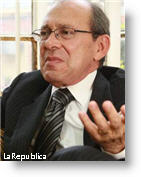 The former head of Peru’s Truth and Reconciliation Commission, Salomon Lerner Febres, called recent criticism of the commission’s final report on the country’s internal conflict unfounded and biased.
The former head of Peru’s Truth and Reconciliation Commission, Salomon Lerner Febres, called recent criticism of the commission’s final report on the country’s internal conflict unfounded and biased.
Lerner Febres, a well-respected academic and former rector of the Universidad Catolica, said that calls for the commission’s report to be revised are “short-sighted.”
Opposition legislators loyal to jailed ex-President Alberto Fujimori have called for the review of the report following the government’s announcement last week that it had killed a high-ranking commander of Shining Path remnants in a coca-growing region.
“Comrade William,” the alias of the Shining Path leader, was —mistakenly— said to be Rolando Cabezas, who local media reported was on a list of missing persons that was compiled by the Truth and Reconciliation Commission, CVR, following the internal conflict during the 1980s and 1990s. Cabezas was reported missing in 1989 when he was 20, taken by force with two cousins by Sendero in Ayacucho.
Even though Cabinet chief Juan Jimenez later clarified that “William” was not on the list —and, in fact, it was later proved with DNA tests that the government had mistakenly identified Rolando Cabezas as being “William”— opposition lawmakers from the right-wing Fuerza 2011 party have called for Congress to review the commission’s report.
Fuerza 2011, which is led by Fujimori’s daughter, former Congresswoman Keiko Fujimori, has long labeled the report “leftist, antimilitarist and anti-Fujimori,” an opinion shared by the Armed Forces and also by the APRA and Accion Popular parties, who governed the country between 1980 an 1990.
The 12-volume report, compiled between 2001 and 2003 after hundreds of interviews and visits to every region by the members of the CVR panel, recognized that the Shining Path had initiated the violence and was responsible for at least 46% of the 70,000 deaths. However, critics have always refused to accept the findings that law enforcement —military and police— were responsible for a large number of deaths, and not in battle.
Alberto Fujimori is serving a 25-year-sentence for human rights abuses in 1991 and 1992 — the Colina death squad killings in the Barrios Altos (15 dead in a family courtyard) and La Cantuta (a university professor and nine students murdered), both of which were reported in detail in the CVR report —and the kidnapping of businessman Samuel Dyer and journalist Gustavo Gorriti during Fujimori’s self-coup in 1992. Fujimori was charged with authorizing both events, but pleaded not guilty.
In a subsequent trial, Fujimori pleaded guilty to corruption charges, but under Peruvian law sentence time is not accumulated and only the longest sentence is served.
During an interview with Ideeleradio on Monday, Lerner Febres defended the truth commission’s report saying that the attacks are politically motivated and aim to weaken the report’s findings.
“I see [the criticism] as something that is really unfounded. I would ask how many of those asking for the review of the [report] have read the report by the commission?” Lerner Febres said.
“No one from the commission pretended to have the absolute truth, we said that from the beginning,” he added. “If one would take the time to read it, it is an open truth, perfectible, where there could be some things that have to be further sharpened, but the broader question is a moral truth.”
“From the moral point of view, Peru suffered a tragedy where human rights were violated.”





